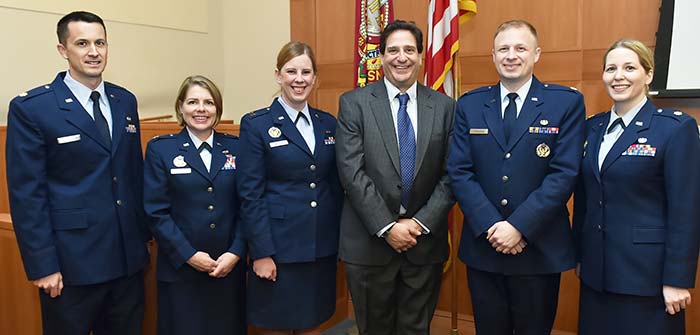The United States Air Force Court of Criminal Appeals heard oral arguments at Fordham Law School on April 15 as to whether a trial judge abused her discretion when she suppressed a staff sergeant’s statements to investigators about his alleged possession of child pornography.
On January 12, the trial judge granted a motion to suppress oral and written statements made by Staff Sergeant Charles D. Buford to investigators, finding the accused’s initial request for counsel was “unambiguous” and thus should have stopped further questioning immediately. Rather than proceed with trial, the government appealed the judge’s decision to grant the motion on the grounds she erroneously applied the law and used unsupported findings of fact.
A three-judge panel led by Senior Judge Colonel Martin T. Mitchell heard an hour’s worth of arguments at Fordham Law on whether Buford asked for an attorney or waived his rights when he met investigators on July 23, 2014, at Yokota Air Base in Japan. The hearing took place in the Gorman Moot Courtroom as part of the Air Force’s Outreach program to expose the public to the military criminal justice system.

Mitchell and fellow judges Colonel Jefferson B. Brown and Colonel Steven D. Dubriske are expected to deliver a ruling by the end of May whether to affirm or overturn the trial judge’s decision, said Major Kevin Gotfredson, an Air Force law clerk. Based on the appeal’s Article 62 status, the judges are not allowed to make findings of fact.
If the government loses its appeal, it can appeal to the United States Court of Appeals for the Armed Forces. If the judge’s ruling is not reversed, the government must decide if it will proceed to trial with the evidence it has. Losing Article 62 appeals usually results in the government not being able to proceed to trial.
Prior to oral arguments, Gotfredson played a three-minute video clip of Buford’s meeting with investigators. The interview came two weeks after investigators learned Buford’s Internet protocol (IP) address was used to download child pornography.
Buford answered “Um, sure” when asked by a special agent whether he wanted a lawyer, according to the Air Force transcript. His attorneys argued successfully in their motion to suppress that this answer should have ended the investigators’ questioning.
“There’s nothing ambiguous about the word ‘sure,’” appellate defense counsel Captain Annie Morgan said. “It means yes.”
“‘Sure’ gets Buford a tuna sandwich, the ability to write a statement, and a polygraph,” she continued. “It gets him everything but an attorney.”
When Buford asked investigators if there were any attorneys on the base, the special agent told him no. The agent’s statements planted doubt in his mind, said Morgan, who represented Buford along with Lieutenant Colonel Joy Primoli. Buford’s visible confusion could also be attributed to the fact he didn’t know he was a suspect, Morgan added.
Major Mary Ellen Payne argued the trial judge applied the wrong law, a subjective standard to whether Buford requested counsel. Buford knowingly waived his right to counsel prior to his oral and written statements when he said “I guess I can talk to ya’all [sic]” and “I’ll talk to y’all,” Payne contested. The suspect initiated conversation after the point the defense said he asked for an attorney, she added.
The rapid-fire exchange between Buford and the agents would have confused any reasonable agent as to whether rights were invoked, Payne said.
“You can’t be confident the suspect is invoking his rights when the suspect is simultaneously asking a question about his right to counsel,” she explained.
At least one of the judges expressed skepticism about the relevance of the government’s argument that the trial judge handled facts incorrectly.
“It almost seems like this is Monday morning quarterbacking to the nth degree,” Judge Brown said, adding the appeals argument Payne made included facts never argued before the trial judge. Payne assured the judge she was not trying to supplement the record.
Buford was not present for the hearing. He remains on active duty in the Air Force and is innocent until proven guilty. He faces a dishonorable discharge and up to 10 years in prison if convicted.

